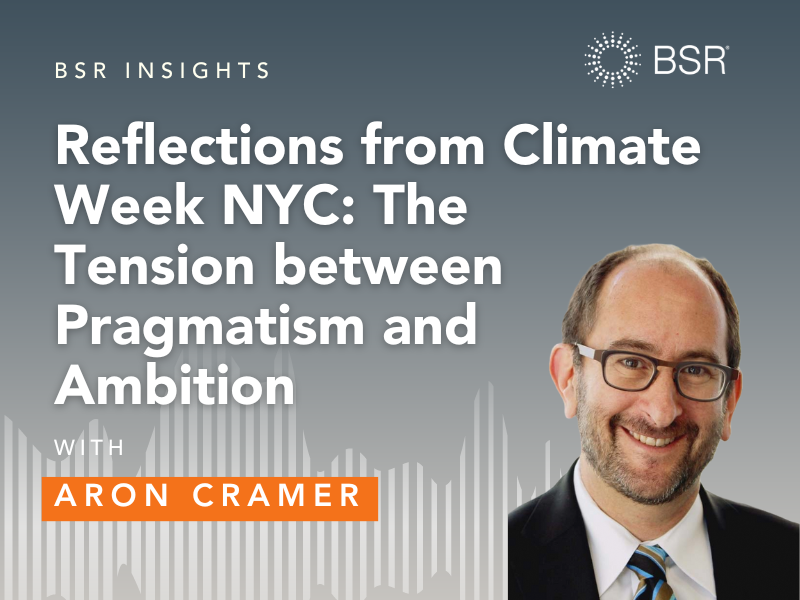
World leaders, CEOs, and NGOs large and small descended on New York last week for the UN General Assembly, UN Climate Action Summit, and Climate Week NYC. After several days of dashing from place to place, navigating streets blocked by the motorcades of presidents and prime ministers, and connecting with other members of the sustainable business tribe, there are reasons for both optimism and pessimism, but mainly greater resolve to act with heightened urgency. I have three big takeaways from the week.
Let’s start with what’s not going in the right direction. While the science on climate impacts continues to paint a grim picture, action from national governments did not match the level of urgency. This week saw the release of yet another report showing that our climate is deteriorating even faster than feared. The Intergovernmental Panel on Climate Change’s latest report tells us that sea levels are rising even faster than projected, potentially leading to “extreme sea level events” hitting once a year by 2050. This latest warning again tells us that we are beginning to experience feedback loops from warming already in the system, which is generating the wrong kind of momentum. We should need no further evidence that action is needed.
While the science on climate impacts continues to paint a grim picture, action from national governments did not match the level of urgency.
Unfortunately, the national governments gathered at the UN Climate Action Summit did not deliver the goods. Political weakness and just plain bad timing hampered commitments from the UK, EU, and others. The US and Brazil are actively hostile to climate action. And China, therefore, had the political space not to exercise more ambition for now and did not meet expectations that they might make significant new commitments.
Second, the pressure on business to act is rising. We are living in a time when the basic principles of capitalism and markets are being questioned more seriously than they have been in a long time. There is a broad recognition that while markets have delivered better livelihoods for many, there are significant flaws that are decreasing social mobility in the mature economies of the Global North, exacerbating income inequality in all corners of the world, and reducing protections for workers subject to structural changes due to automation, the shift to a clean energy economy, and changing demographics.
The recent Business Roundtable statement on its purpose echoed across Manhattan all week, encapsulating a sense that the purpose of business needs an overhaul. Even more, the millions of students who took to the streets to demand and inspire climate action have most certainly gotten their message across. This is widely seen as a game changer, and no one believes the vision is only about Greta—it’s bigger than that. When our kids and our fellow employees are taking to the streets, something important is changing.
When our kids and our fellow employees are taking to the streets, something important is changing.
Third, the good news is that business action is rising. At the UN, Lise Kingo of the UN Global Compact proudly announced that 87 companies have embraced a 1.5°C degree target and that the numbers are growing quickly. This is a commitment that was unthinkable even at the start of 2019 for most companies. There are multiple new commitments to nature-based solutions. Investors—including some of the largest banks in the world—have committed to aligning their investments with a net zero target. Let us not forget that just four years ago, there was serious doubt whether the world would come together at Paris. Today, net zero at or before mid-century has become a baseline commitment—now including Amazon, which dove in with its first major climate commitment the weekend before UNGA kicked off.
What’s more, innovations emerging far from the carpeted hallways of the SDGs or the comfortable UNGA Week receptions high above Manhattan provided signals of even more exciting progress to come. I had the chance to learn about Terraton, a new company considered one of the few sustainability unicorns. Terraton has been making rapid progress to enable farmers to remove one trillion tons of carbon from the atmosphere. This audacious effort from Indigo Ag has the benefit of appearing to be remarkably plausible.
And while there are indeed many exciting efforts being launched, one note of caution. The proliferation of well-intentioned collaborations is also creating gridlock on the scale of UNGA Week traffic in midtown Manhattan. Without a concerted effort to align all these initiatives—and quite possibly see some fade away—we will see duplication and confusion that delivers wasted effort rather than impact. Over the past several days, I picked up a growing sense of frustration on the part of business that this swell of new initiatives is sapping energy, confusing the market, and generally not maximizing impact. There are some efforts—including some in which BSR is involved—to align initiatives, but all of us in the sustainability world should think twice before launching “yet another” effort to do what others may already be doing.
We are about to enter the Decisive Decade of the 2020s, when we will deliver on the SDGs and the promise of Paris…or not. We cannot be blind to the scope and scale of the challenge, and the reality that we are not—yet—on track to deliver on the vision of sustainable prosperity for all. Indeed, our only choice is to redouble efforts. Ambition and urgency are badly needed, and the community of leaders in New York this week sent powerful signals that they are up to the task. Now that we have all left Manhattan, it’s time to deliver the goods.
Topics
Let’s talk about how BSR can help you to transform your business and achieve your sustainability goals.








